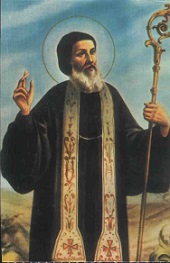
Saint John Chrysostom
Feast January 27th
Bishop of Constantinople, Doctor of the Church (344-407 AD)
Saint John Chrysostom, born in Antioch in 344, was endowed with a superior genius strengthened by a brilliant education. In order to break with a world which admired and courted him, in 374 he retired for six years to a neighboring mountain, having found Christ through his friendship with Saint Basil. After acquiring the art of Christian silence, he returned to Antioch and there labored for four years as a priest under the direction of its bishop. His eloquence was such that the entire city, up to a hundred thousand listeners, came to hear him, a man not yet forty years old. He fled this popularity for fourteen years, adopting the monastic life until he was forcibly consecrated Patriarch of Constantinople in 398.
The effect of his sermons was everywhere marvelous. He converted a large number of pagans and heretics by his eloquence and constantly exhorted his Catholic people to frequent the Holy Sacrifice. In order to remove all excuse for absence he abbreviated the long liturgy then in use. Saint Nilus relates that Saint John Chrysostom, when the priest began the Holy Sacrifice, very often saw many of the Blessed coming down from heaven in shining garments, eyes intent, and bowed heads, in utter stillness and silence, assisting at the consummation of the tremendous mystery. [1]
Beloved as he was in Constantinople, his denunciations of vice made him numerous enemies; Theophilus, archbishop of Alexandria, feared the growth in importance of the Bishop of Constantinople and falsely charged John with fostering heresy. Theophilus and other angered bishops were supported by Eudoxia, the empress, who resented John’s sermons contrasting gospel values with the excesses of imperial court life. Whether intended or not, sermons mentioning the lurid Jezebel (1 Kings 9:1—21:23) and impious Herodias (Mark 6:17-29) were associated with the empress, who finally managed to have John exiled in 403. [2]
Although he was almost immediately recalled, it was not more than a reprieve. In 404 he was banished to Cucusus in the deserts of the Taurus mountains. His reply to the hostile empress was: Chrysostom fears only one thing — not exile, prison, poverty or death — but sin.
In 407, at sixty-three years old his strength was waning, but his enemies were impatient and transported him to Pytius on the Euxine, a rough journey of nearly 400 miles. He was assiduously exposed to every hardship — cold, wet clothing, and semi-starvation, but nothing could overcome his cheerfulness and his consideration for others. On the journey his sickness increased, and he was warned that his end was near. Thereupon, exchanging his travel-stained clothes for white garments, he received Viaticum, and with his customary words, Glory be to God for all things. Amen, passed to Christ. He does not have the title of martyrdom, but possesses all its merit and all its glory. He is the author of the famous words characterizing Saint Paul, object of his admiration and love: The heart of Paul was the Heart of Christ. [1]
His zeal led him to decisive action. Bishops who bribed their way into office were deposed. Many of his sermons called for concrete steps to share wealth with the poor. The rich did not appreciate hearing from John that private property existed because of Adam’s fall from grace any more than married men liked to hear that they were bound to marital fidelity just as much as their wives were. When it came to justice and charity, John acknowledged no double standards. [2]
References and Excerpts
[1] “Lives of the Saints, St John Chrysostom,” Magnificat, 13 July 2013. [Online]. Available: https://magnificat.ca/cal/en/saints/sai … ostom.html. [Accessed 8 January 2016].
[2] “Saint of the Day, St. John Chrysostom,” American Catholic, [Online]. Available: http://www.americancatholic.org/Feature … px?id=1137. [Accessed 8 January 2016].
[3] “St. John Chrysostom,” Catholic Online, [Online]. Available: http://www.catholic.org/saints/saint.php?saint_id=64. [Accessed 8 January 2016].